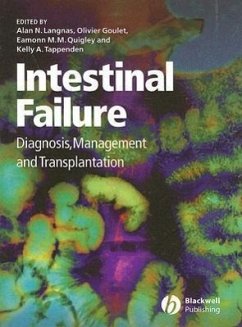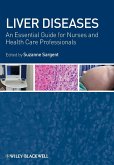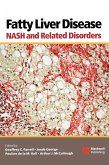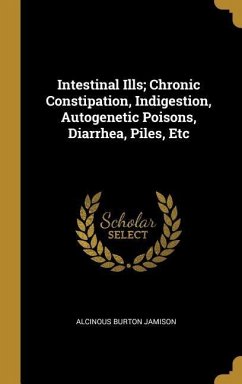LangnasDiagnosis, Management and Transplantation
Intestinal Failure
Diagnosis, Management and Transplantation
Herausgeber: Langnas, Alan; Tappenden, Kelly A; Quigley, Eamonn M M; Goulet, Olivier
LangnasDiagnosis, Management and Transplantation
Intestinal Failure
Diagnosis, Management and Transplantation
Herausgeber: Langnas, Alan; Tappenden, Kelly A; Quigley, Eamonn M M; Goulet, Olivier
- Gebundenes Buch
- Merkliste
- Auf die Merkliste
- Bewerten Bewerten
- Teilen
- Produkt teilen
- Produkterinnerung
- Produkterinnerung
Intestinal failure is a challenging, emerging field that has been the subject of much research and debate in recent years and has only recently become widely accepted as a distinct clinical syndrome. This comprehensive book provides an in-depth review of scientific theory and clinical practice relating to intestinal failure with specific emphasis on assessment and management as part of a multidisciplinary team. Compiled by an internationally recognised editorial team, the book provides a practical how-to guide to the management of adult and pediatric patients with intestinal failure, focusing…mehr
Andere Kunden interessierten sich auch für
![Liver Diseases Liver Diseases]() Liver Diseases109,99 €
Liver Diseases109,99 €![Fatty Liver Disease Fatty Liver Disease]() Farrell G.C. Geoff / George J. Jacob / Hall P. de la M. PaulineFatty Liver Disease248,99 €
Farrell G.C. Geoff / George J. Jacob / Hall P. de la M. PaulineFatty Liver Disease248,99 €![Intestinal Failure and Rehabilitation Intestinal Failure and Rehabilitation]() Laura E. Matarese / Ezra Steiger / Douglas L. Seidner (eds.)Intestinal Failure and Rehabilitation273,99 €
Laura E. Matarese / Ezra Steiger / Douglas L. Seidner (eds.)Intestinal Failure and Rehabilitation273,99 €![A Treatise On the Nature and Cure of Intestinal Worms of the Human Body A Treatise On the Nature and Cure of Intestinal Worms of the Human Body]() William RhindA Treatise On the Nature and Cure of Intestinal Worms of the Human Body33,99 €
William RhindA Treatise On the Nature and Cure of Intestinal Worms of the Human Body33,99 €![INTESTINAL AUTO-INTOXICATION INTESTINAL AUTO-INTOXICATION]() Adolphe CombeINTESTINAL AUTO-INTOXICATION45,99 €
Adolphe CombeINTESTINAL AUTO-INTOXICATION45,99 €![Constipation and Allied Intestinal Disorders Constipation and Allied Intestinal Disorders]() Arthur Frederick HurstConstipation and Allied Intestinal Disorders44,99 €
Arthur Frederick HurstConstipation and Allied Intestinal Disorders44,99 €![Intestinal Ills; Chronic Constipation, Indigestion, Autogenetic Poisons, Diarrhea, Piles, Etc Intestinal Ills; Chronic Constipation, Indigestion, Autogenetic Poisons, Diarrhea, Piles, Etc]() Alcinous Burton JamisonIntestinal Ills; Chronic Constipation, Indigestion, Autogenetic Poisons, Diarrhea, Piles, Etc37,99 €
Alcinous Burton JamisonIntestinal Ills; Chronic Constipation, Indigestion, Autogenetic Poisons, Diarrhea, Piles, Etc37,99 €-
-
Intestinal failure is a challenging, emerging field that has been the subject of much research and debate in recent years and has only recently become widely accepted as a distinct clinical syndrome. This comprehensive book provides an in-depth review of scientific theory and clinical practice relating to intestinal failure with specific emphasis on assessment and management as part of a multidisciplinary team. Compiled by an internationally recognised editorial team, the book provides a practical how-to guide to the management of adult and pediatric patients with intestinal failure, focusing on quality-of-life issues that are at the heart of patient care. * World experts from centers of excellence share their clinical experience and expertise, offering the first ever authoritative resource on intestinal failure * All aspects of patient management are covered, from diagnosis and medical and surgical management (including transplantation) to nutritional consideration and psychosocial aspects of care * Numerous illustrations, flow diagrams and summary boxes complement the text and emphasize important concepts, providing an accessible approach to this complex field This landmark book is essential reading for any gastroenterologists, surgeons, transplant teams or clinical nutritionists involved in the care of patients with intestinal failure.
Hinweis: Dieser Artikel kann nur an eine deutsche Lieferadresse ausgeliefert werden.
Hinweis: Dieser Artikel kann nur an eine deutsche Lieferadresse ausgeliefert werden.
Produktdetails
- Produktdetails
- Verlag: Wiley
- Seitenzahl: 416
- Erscheinungstermin: 10. März 2008
- Englisch
- Abmessung: 253mm x 188mm x 26mm
- Gewicht: 1161g
- ISBN-13: 9781405146371
- ISBN-10: 1405146370
- Artikelnr.: 22963771
- Herstellerkennzeichnung
- Libri GmbH
- Europaallee 1
- 36244 Bad Hersfeld
- gpsr@libri.de
- Verlag: Wiley
- Seitenzahl: 416
- Erscheinungstermin: 10. März 2008
- Englisch
- Abmessung: 253mm x 188mm x 26mm
- Gewicht: 1161g
- ISBN-13: 9781405146371
- ISBN-10: 1405146370
- Artikelnr.: 22963771
- Herstellerkennzeichnung
- Libri GmbH
- Europaallee 1
- 36244 Bad Hersfeld
- gpsr@libri.de
Alan N. Langnas, DO is Chief of Transplantation and Director of the Liver and Intestinal Transplantation Program at the University of Nebraska Medical Center, Omaha, USA. Professor Langnas has been doing liver transplants at UNMC since 1988 and over the past seven years has performed more than 40 intestinal and intestinal/liver transplants, establishing the UNMC program as one of the top transplant centers in the world performing multiple organ transplants. Along side his transplant work, Professor Langnas also maintains an active practice treating non-transplant hepato-biliary patients and serves on the editorial boards of several medical journals. In addition to writing more than 100 research papers for medical journals, he is also active in several capacities with the United Network for Organ Sharing, the national organ allocation system in the U.S. Olivier Goulet, MD, PhD Pediatric Gastroenterology-Hepatology and Nutrition, Reference Center for Rare Digestive Diseases, Integrated Program of Intestinal Failure, Home Parenteral Nutrition and Intestinal Transplantation, University of Paris-Descartes, Necker Hospital, Paris, France. Eamonn M.M. Quigley, MD, FRCP, FACP, FACG, FRCPI is Professor of Medicine and Human Physiology and Head of the Medical School at the National University of Ireland (NUI), Cork. He also serves as Adjunct Professor of Medicine and Physiology at the University of Nebraska Medical Center in Omaha, USA. He is Editor-in-Chief of the American Journal of Gastroenterology and Vice-President of the World Organization of Gastroenterology (OMGE - Organisation Mondiale de Gastroentérologie). His major research interests are in the areas of motility, functional gastrointestinal disorders and gastrointestinal dysfunction in systemic disease. He has published over 400 original papers, reviews, editorials and book chapters and has received numerous awards from universities and societies worldwide. Kelly A. Tappenden, PhD, RD is Associate Professor of Nutrition and Gastrointestinal Physiology in the Division of Nutritional Sciences at the University of Illinois at Urbana-Champaign, USA. Professor Tappenden recently received the 2005 American Society of Parenteral and Enteral Nutrition Dudrick Research Scholar Award and the 2004 College of Agricultural, Consumer and Environmental Sciences Faculty Award for Excellence in Research. Professor Tappenden's research interests include the regulation of small intestinal function by various nutrients and gastrointestinal-specific pepides. Her recent publications are featured in the Journal of Parenteral and Enteral Nutrition, Journal of Pediatric Gastroenterology and Nutrition and Journal of Nutrition. In addition to her academic research, Professor Tappenden is also a Registered Dietician, having completed clinical training at the Misericordia Hospital in Edmonton, Alberta.
List of Contributors.
Foreword.
Preface.
Abbreviations.
Part 1 Introduction.
1 The History of Intestinal Failure and Transplantation: Alan N. Langnas
(University of Nebraska Medical Center).
Part 2 Intestinal Physiology and Immunology.
2 Intestinal Morphology, Intestinal Regeneration and the Promise of Tissue
Engineering: David A.J. Lloyd (St Mark's Hospital Harrow) and Simon M. Gabe
(St Mark's Hospital Harrow).
3 Basic Physiology of Motility, Absorption and Secretion: Greger Lindberg
(Karolinska Institutet).
4 Immunology of the Small Intestine: Liam O'Mahony (University College
Cork).
5 Intestinal Adaptation: The Biology of the Intestinal Response to
Resection and Disease: Marc S. Levin (St Louis VA Medical Center) and
Deborah C. Rubin (Washington University School of Medicine).
Part 3 Intestinal Failure: Definition and Pathophysiology.
6 Intestinal Failure: Definitions and Classifications: Dominique M. Jan
(Columbia University).
7 Causes of Intestinal Failure in the Newborn: Yigael Finkel (Karolinska
Institutet).
8 Congenital Enteropathies Causing Permanent Intestinal Failure: Olivier
Goulet (University of Paris-Descartes).
9 Causes of Intestinal Failure in the Adult: Harry C. Sax (The Warren
Alpert Medical School of Brown University).
10 Intestinal Failure Related to Bariatric Surgery: Jon S. Thompson
(University of Nebraska Medical Center).
11 Inflammatory Bowel Disease and the Short Bowel Syndrome: Ramsey K. Umar
(Feinberg School of Medicine) and Alan L. Buchman (Feinberg School of
Medicine).
12 Motility Disorders: Hayat Mousa (Center for Advanced Research in
Neuromuscular Gastrointestinal Disorders (C.A.R.I.N.G)) and Carlo Di
Lorenzo (The Ohio State University and Columbus Children's Hospital).
Part 4 Assessment and General Management of Intestinal Failure.
13 Assessment of Intestinal Failure Patients: Clarivet Torres (Georgetown
University Hospital).
14 Guidelines for Home Parenteral Nutrition Support in Chronic Intestinal
Failure Patients: Bernard Messing (Reference Centre for Rare Digestive
Diseases), Francisca Joly (Reference Centre for Rare Digestive Diseases)
and Virginie Colomb (Reference Centre for Rare Digestive Diseases).
15 Home Parenteral Nutrition: Complications, Survival, Costs and Quality of
Life: John K. DiBaise (Mayo Clinic).
16 Vascular Access, Including Complications: Sanja Koläek (Children's
Hospital Zagreb) and Julije Metrovi¿(Spit University Hospital).
17 Enteral Support for Children with Intestinal Failure: Daniel S. Kamin
(Children's Hospital, Boston) and Christopher Duggan (Children's Hospital,
Boston).
18 The Use of Enteral Nutrition in the Adult with Intestinal Failure:
Khursheed N. Jeejeebhoy (University of Toronto).
19 The Enteric Flora in Intestinal Failure: Small Intestinal Bacterial
Overgrowth and Gut-Derived Sepsis: Eamonn M.M. Quigley (National University
of Ireland, Cork), Rodrigo Quera (Hospital Clinico Universidad de Chile)
and Ahmed Abu-Shanab (National University of Ireland, Cork).
20 Management of Complex Fluid and Electrolyte Disturbances: Stuart S.
Kaufman (Georgetown University Transplant Institute and Children's National
Medical Center) and Erin M. Fennelly (Georgetown University Transplant
Institute).
21 Intestinal Failure-Associated Liver Disease: Sue V. Beath (Birmingham
Children's Hospital) and Jeremy M. Woodward (Addenbrooke's Hospital).
22 Psychiatric Issues in the Assessment of the Patient with Intestinal
Failure: James H. Sorrell (Nebraska Medical Center).
23 Munchausen Syndrome by Proxy: Paul E. Hyman (University of Kansas School
of Medicine) and Brenda Bursch (David Geffen School of Medicine at UCLA).
Part 5 Pharmacological Approaches to Intestinal Failure.
24 Luminal Nutrient Factors in Intestinal Adaptation and Their Use in
Therapy: Jon A. Vanderhoof (Children's Hospital, Boston) and Rosemary J.
Young (Boys Town National Research Hospital).
25 The Role of Humoral Factors in Intestinal Adaptation: Jennifer N.
Woodard (University of Illinois at Urbana-Champaign) and Kelly A. Tappenden
(University of Illinois at Urbana-Champaign).
Part 6 Autologous Reconstruction of the GI Tract.
26 Autologous Reconstruction of the GI Tract: Debra Sudan (University of
Nebraska).
Part 7 Organ Replacement Therapy for Intestinal Failure.
27 Intestinal Transplantation: Indications and Patient Selection: Kareem M.
Abu-Elmagd (University of Pittsburgh Medical Center).
28 Isolated Small Bowel Transplantation and Combined Liver-Small Bowel
Transplantation: Douglas G. Farmer (Dumont-UCLA Transplant Center).
29 Living Donor Intestinal Transplantation: Enrico Benedetti (University of
Illinois at Chicago), Fabrizio Panaro (University of Illinois at Chicago)
and Giuliano Testa (University of Chicago Medical Center).
30 Isolated Liver Transplantation for Intestinal Failure-Associated Liver
Disease: Jean F. Botha (University of Nebraska Medical Center) and Alan N.
Langnas (University of Nebraska Medical Center).
31 Preservation of the Intestine: Vincent B. Nieuwenhuijs (University
Medical Center Groningen), Mihai Oltean (Sahlgrenska University Hospital),
Henri G. Leuvenink (University of Groningen) and Rutger J. Ploeg
(University Medical Center Groningen).
32 Immediate Postoperative Care of the Intestinal Transplant Recipient:
Gabriel J. Hauser (Georgetown University Children's Medical Center),
Jeffrey S. Plotkin (Georgetown University Hospital) and Thomas Fishbein
(Georgetown University Hospital).
33 Surgical Complications of Intestinal Transplantation: Wendy J. Grant
(University of Nebraska Medical Center).
34 Infections in Small Bowel Transplant Recipients: Alison Freifeld
(University of Nebraska Medical Center) and Andre Kalil (University of
Nebraska Medical Center).
35 Immunosuppression after Intestinal Transplantation: Raquel Garcia-Roca
(University of Minnesota) and Rainer Gruessner (University of Arizona).
36 Immunology of Intestinal Allograft Rejection: Kenneth A. Newell (Emory
University) and Jonathan P. Fryer (Feinberg School of Medicine).
37 Histopathology of Intestinal Transplantation: Tong Wu (University of
Pittsburgh Medical Center) and Anthony J. Demetris (University of
Pittsburgh Medical Center).
38 Long-Term Management of Intestinal Transplant Recipients: Frances R.
Malone (Children's Hospital and Regional Medical Center Seattle) and Simon
P. Horslen (Children's Hospital and Regional Medical Center Seattle).
39 Management of Posttransplant Lymphoproliferative Disease: Thomas G.
Gross (The Ohio State University).
40 Results of Intestinal Transplantation: David R. Grant (University of
Toronto) and Shimul A. Shah (University of Massachusetts Memorial Medical
Center).
41 Psychosocial Assessment and Management of the Transplant Patient/Family
in Intestinal Transplantation: Jodi Gentleman (The Nebraska Medical
Center), Leonard W. Penkoski (University of Nebraska Medical Center).
and James H. Sorrell (Nebraska Medical Center).
42 Financial, Economic and Insurance Issues Pertaining to Intestinal
Transplantation: When Is Too Much Not Enough?: Roger W. Evans (Consultant
in Health Care Rochester).
Index
Foreword.
Preface.
Abbreviations.
Part 1 Introduction.
1 The History of Intestinal Failure and Transplantation: Alan N. Langnas
(University of Nebraska Medical Center).
Part 2 Intestinal Physiology and Immunology.
2 Intestinal Morphology, Intestinal Regeneration and the Promise of Tissue
Engineering: David A.J. Lloyd (St Mark's Hospital Harrow) and Simon M. Gabe
(St Mark's Hospital Harrow).
3 Basic Physiology of Motility, Absorption and Secretion: Greger Lindberg
(Karolinska Institutet).
4 Immunology of the Small Intestine: Liam O'Mahony (University College
Cork).
5 Intestinal Adaptation: The Biology of the Intestinal Response to
Resection and Disease: Marc S. Levin (St Louis VA Medical Center) and
Deborah C. Rubin (Washington University School of Medicine).
Part 3 Intestinal Failure: Definition and Pathophysiology.
6 Intestinal Failure: Definitions and Classifications: Dominique M. Jan
(Columbia University).
7 Causes of Intestinal Failure in the Newborn: Yigael Finkel (Karolinska
Institutet).
8 Congenital Enteropathies Causing Permanent Intestinal Failure: Olivier
Goulet (University of Paris-Descartes).
9 Causes of Intestinal Failure in the Adult: Harry C. Sax (The Warren
Alpert Medical School of Brown University).
10 Intestinal Failure Related to Bariatric Surgery: Jon S. Thompson
(University of Nebraska Medical Center).
11 Inflammatory Bowel Disease and the Short Bowel Syndrome: Ramsey K. Umar
(Feinberg School of Medicine) and Alan L. Buchman (Feinberg School of
Medicine).
12 Motility Disorders: Hayat Mousa (Center for Advanced Research in
Neuromuscular Gastrointestinal Disorders (C.A.R.I.N.G)) and Carlo Di
Lorenzo (The Ohio State University and Columbus Children's Hospital).
Part 4 Assessment and General Management of Intestinal Failure.
13 Assessment of Intestinal Failure Patients: Clarivet Torres (Georgetown
University Hospital).
14 Guidelines for Home Parenteral Nutrition Support in Chronic Intestinal
Failure Patients: Bernard Messing (Reference Centre for Rare Digestive
Diseases), Francisca Joly (Reference Centre for Rare Digestive Diseases)
and Virginie Colomb (Reference Centre for Rare Digestive Diseases).
15 Home Parenteral Nutrition: Complications, Survival, Costs and Quality of
Life: John K. DiBaise (Mayo Clinic).
16 Vascular Access, Including Complications: Sanja Koläek (Children's
Hospital Zagreb) and Julije Metrovi¿(Spit University Hospital).
17 Enteral Support for Children with Intestinal Failure: Daniel S. Kamin
(Children's Hospital, Boston) and Christopher Duggan (Children's Hospital,
Boston).
18 The Use of Enteral Nutrition in the Adult with Intestinal Failure:
Khursheed N. Jeejeebhoy (University of Toronto).
19 The Enteric Flora in Intestinal Failure: Small Intestinal Bacterial
Overgrowth and Gut-Derived Sepsis: Eamonn M.M. Quigley (National University
of Ireland, Cork), Rodrigo Quera (Hospital Clinico Universidad de Chile)
and Ahmed Abu-Shanab (National University of Ireland, Cork).
20 Management of Complex Fluid and Electrolyte Disturbances: Stuart S.
Kaufman (Georgetown University Transplant Institute and Children's National
Medical Center) and Erin M. Fennelly (Georgetown University Transplant
Institute).
21 Intestinal Failure-Associated Liver Disease: Sue V. Beath (Birmingham
Children's Hospital) and Jeremy M. Woodward (Addenbrooke's Hospital).
22 Psychiatric Issues in the Assessment of the Patient with Intestinal
Failure: James H. Sorrell (Nebraska Medical Center).
23 Munchausen Syndrome by Proxy: Paul E. Hyman (University of Kansas School
of Medicine) and Brenda Bursch (David Geffen School of Medicine at UCLA).
Part 5 Pharmacological Approaches to Intestinal Failure.
24 Luminal Nutrient Factors in Intestinal Adaptation and Their Use in
Therapy: Jon A. Vanderhoof (Children's Hospital, Boston) and Rosemary J.
Young (Boys Town National Research Hospital).
25 The Role of Humoral Factors in Intestinal Adaptation: Jennifer N.
Woodard (University of Illinois at Urbana-Champaign) and Kelly A. Tappenden
(University of Illinois at Urbana-Champaign).
Part 6 Autologous Reconstruction of the GI Tract.
26 Autologous Reconstruction of the GI Tract: Debra Sudan (University of
Nebraska).
Part 7 Organ Replacement Therapy for Intestinal Failure.
27 Intestinal Transplantation: Indications and Patient Selection: Kareem M.
Abu-Elmagd (University of Pittsburgh Medical Center).
28 Isolated Small Bowel Transplantation and Combined Liver-Small Bowel
Transplantation: Douglas G. Farmer (Dumont-UCLA Transplant Center).
29 Living Donor Intestinal Transplantation: Enrico Benedetti (University of
Illinois at Chicago), Fabrizio Panaro (University of Illinois at Chicago)
and Giuliano Testa (University of Chicago Medical Center).
30 Isolated Liver Transplantation for Intestinal Failure-Associated Liver
Disease: Jean F. Botha (University of Nebraska Medical Center) and Alan N.
Langnas (University of Nebraska Medical Center).
31 Preservation of the Intestine: Vincent B. Nieuwenhuijs (University
Medical Center Groningen), Mihai Oltean (Sahlgrenska University Hospital),
Henri G. Leuvenink (University of Groningen) and Rutger J. Ploeg
(University Medical Center Groningen).
32 Immediate Postoperative Care of the Intestinal Transplant Recipient:
Gabriel J. Hauser (Georgetown University Children's Medical Center),
Jeffrey S. Plotkin (Georgetown University Hospital) and Thomas Fishbein
(Georgetown University Hospital).
33 Surgical Complications of Intestinal Transplantation: Wendy J. Grant
(University of Nebraska Medical Center).
34 Infections in Small Bowel Transplant Recipients: Alison Freifeld
(University of Nebraska Medical Center) and Andre Kalil (University of
Nebraska Medical Center).
35 Immunosuppression after Intestinal Transplantation: Raquel Garcia-Roca
(University of Minnesota) and Rainer Gruessner (University of Arizona).
36 Immunology of Intestinal Allograft Rejection: Kenneth A. Newell (Emory
University) and Jonathan P. Fryer (Feinberg School of Medicine).
37 Histopathology of Intestinal Transplantation: Tong Wu (University of
Pittsburgh Medical Center) and Anthony J. Demetris (University of
Pittsburgh Medical Center).
38 Long-Term Management of Intestinal Transplant Recipients: Frances R.
Malone (Children's Hospital and Regional Medical Center Seattle) and Simon
P. Horslen (Children's Hospital and Regional Medical Center Seattle).
39 Management of Posttransplant Lymphoproliferative Disease: Thomas G.
Gross (The Ohio State University).
40 Results of Intestinal Transplantation: David R. Grant (University of
Toronto) and Shimul A. Shah (University of Massachusetts Memorial Medical
Center).
41 Psychosocial Assessment and Management of the Transplant Patient/Family
in Intestinal Transplantation: Jodi Gentleman (The Nebraska Medical
Center), Leonard W. Penkoski (University of Nebraska Medical Center).
and James H. Sorrell (Nebraska Medical Center).
42 Financial, Economic and Insurance Issues Pertaining to Intestinal
Transplantation: When Is Too Much Not Enough?: Roger W. Evans (Consultant
in Health Care Rochester).
Index
List of Contributors.
Foreword.
Preface.
Abbreviations.
Part 1 Introduction.
1 The History of Intestinal Failure and Transplantation: Alan N. Langnas
(University of Nebraska Medical Center).
Part 2 Intestinal Physiology and Immunology.
2 Intestinal Morphology, Intestinal Regeneration and the Promise of Tissue
Engineering: David A.J. Lloyd (St Mark's Hospital Harrow) and Simon M. Gabe
(St Mark's Hospital Harrow).
3 Basic Physiology of Motility, Absorption and Secretion: Greger Lindberg
(Karolinska Institutet).
4 Immunology of the Small Intestine: Liam O'Mahony (University College
Cork).
5 Intestinal Adaptation: The Biology of the Intestinal Response to
Resection and Disease: Marc S. Levin (St Louis VA Medical Center) and
Deborah C. Rubin (Washington University School of Medicine).
Part 3 Intestinal Failure: Definition and Pathophysiology.
6 Intestinal Failure: Definitions and Classifications: Dominique M. Jan
(Columbia University).
7 Causes of Intestinal Failure in the Newborn: Yigael Finkel (Karolinska
Institutet).
8 Congenital Enteropathies Causing Permanent Intestinal Failure: Olivier
Goulet (University of Paris-Descartes).
9 Causes of Intestinal Failure in the Adult: Harry C. Sax (The Warren
Alpert Medical School of Brown University).
10 Intestinal Failure Related to Bariatric Surgery: Jon S. Thompson
(University of Nebraska Medical Center).
11 Inflammatory Bowel Disease and the Short Bowel Syndrome: Ramsey K. Umar
(Feinberg School of Medicine) and Alan L. Buchman (Feinberg School of
Medicine).
12 Motility Disorders: Hayat Mousa (Center for Advanced Research in
Neuromuscular Gastrointestinal Disorders (C.A.R.I.N.G)) and Carlo Di
Lorenzo (The Ohio State University and Columbus Children's Hospital).
Part 4 Assessment and General Management of Intestinal Failure.
13 Assessment of Intestinal Failure Patients: Clarivet Torres (Georgetown
University Hospital).
14 Guidelines for Home Parenteral Nutrition Support in Chronic Intestinal
Failure Patients: Bernard Messing (Reference Centre for Rare Digestive
Diseases), Francisca Joly (Reference Centre for Rare Digestive Diseases)
and Virginie Colomb (Reference Centre for Rare Digestive Diseases).
15 Home Parenteral Nutrition: Complications, Survival, Costs and Quality of
Life: John K. DiBaise (Mayo Clinic).
16 Vascular Access, Including Complications: Sanja Koläek (Children's
Hospital Zagreb) and Julije Metrovi¿(Spit University Hospital).
17 Enteral Support for Children with Intestinal Failure: Daniel S. Kamin
(Children's Hospital, Boston) and Christopher Duggan (Children's Hospital,
Boston).
18 The Use of Enteral Nutrition in the Adult with Intestinal Failure:
Khursheed N. Jeejeebhoy (University of Toronto).
19 The Enteric Flora in Intestinal Failure: Small Intestinal Bacterial
Overgrowth and Gut-Derived Sepsis: Eamonn M.M. Quigley (National University
of Ireland, Cork), Rodrigo Quera (Hospital Clinico Universidad de Chile)
and Ahmed Abu-Shanab (National University of Ireland, Cork).
20 Management of Complex Fluid and Electrolyte Disturbances: Stuart S.
Kaufman (Georgetown University Transplant Institute and Children's National
Medical Center) and Erin M. Fennelly (Georgetown University Transplant
Institute).
21 Intestinal Failure-Associated Liver Disease: Sue V. Beath (Birmingham
Children's Hospital) and Jeremy M. Woodward (Addenbrooke's Hospital).
22 Psychiatric Issues in the Assessment of the Patient with Intestinal
Failure: James H. Sorrell (Nebraska Medical Center).
23 Munchausen Syndrome by Proxy: Paul E. Hyman (University of Kansas School
of Medicine) and Brenda Bursch (David Geffen School of Medicine at UCLA).
Part 5 Pharmacological Approaches to Intestinal Failure.
24 Luminal Nutrient Factors in Intestinal Adaptation and Their Use in
Therapy: Jon A. Vanderhoof (Children's Hospital, Boston) and Rosemary J.
Young (Boys Town National Research Hospital).
25 The Role of Humoral Factors in Intestinal Adaptation: Jennifer N.
Woodard (University of Illinois at Urbana-Champaign) and Kelly A. Tappenden
(University of Illinois at Urbana-Champaign).
Part 6 Autologous Reconstruction of the GI Tract.
26 Autologous Reconstruction of the GI Tract: Debra Sudan (University of
Nebraska).
Part 7 Organ Replacement Therapy for Intestinal Failure.
27 Intestinal Transplantation: Indications and Patient Selection: Kareem M.
Abu-Elmagd (University of Pittsburgh Medical Center).
28 Isolated Small Bowel Transplantation and Combined Liver-Small Bowel
Transplantation: Douglas G. Farmer (Dumont-UCLA Transplant Center).
29 Living Donor Intestinal Transplantation: Enrico Benedetti (University of
Illinois at Chicago), Fabrizio Panaro (University of Illinois at Chicago)
and Giuliano Testa (University of Chicago Medical Center).
30 Isolated Liver Transplantation for Intestinal Failure-Associated Liver
Disease: Jean F. Botha (University of Nebraska Medical Center) and Alan N.
Langnas (University of Nebraska Medical Center).
31 Preservation of the Intestine: Vincent B. Nieuwenhuijs (University
Medical Center Groningen), Mihai Oltean (Sahlgrenska University Hospital),
Henri G. Leuvenink (University of Groningen) and Rutger J. Ploeg
(University Medical Center Groningen).
32 Immediate Postoperative Care of the Intestinal Transplant Recipient:
Gabriel J. Hauser (Georgetown University Children's Medical Center),
Jeffrey S. Plotkin (Georgetown University Hospital) and Thomas Fishbein
(Georgetown University Hospital).
33 Surgical Complications of Intestinal Transplantation: Wendy J. Grant
(University of Nebraska Medical Center).
34 Infections in Small Bowel Transplant Recipients: Alison Freifeld
(University of Nebraska Medical Center) and Andre Kalil (University of
Nebraska Medical Center).
35 Immunosuppression after Intestinal Transplantation: Raquel Garcia-Roca
(University of Minnesota) and Rainer Gruessner (University of Arizona).
36 Immunology of Intestinal Allograft Rejection: Kenneth A. Newell (Emory
University) and Jonathan P. Fryer (Feinberg School of Medicine).
37 Histopathology of Intestinal Transplantation: Tong Wu (University of
Pittsburgh Medical Center) and Anthony J. Demetris (University of
Pittsburgh Medical Center).
38 Long-Term Management of Intestinal Transplant Recipients: Frances R.
Malone (Children's Hospital and Regional Medical Center Seattle) and Simon
P. Horslen (Children's Hospital and Regional Medical Center Seattle).
39 Management of Posttransplant Lymphoproliferative Disease: Thomas G.
Gross (The Ohio State University).
40 Results of Intestinal Transplantation: David R. Grant (University of
Toronto) and Shimul A. Shah (University of Massachusetts Memorial Medical
Center).
41 Psychosocial Assessment and Management of the Transplant Patient/Family
in Intestinal Transplantation: Jodi Gentleman (The Nebraska Medical
Center), Leonard W. Penkoski (University of Nebraska Medical Center).
and James H. Sorrell (Nebraska Medical Center).
42 Financial, Economic and Insurance Issues Pertaining to Intestinal
Transplantation: When Is Too Much Not Enough?: Roger W. Evans (Consultant
in Health Care Rochester).
Index
Foreword.
Preface.
Abbreviations.
Part 1 Introduction.
1 The History of Intestinal Failure and Transplantation: Alan N. Langnas
(University of Nebraska Medical Center).
Part 2 Intestinal Physiology and Immunology.
2 Intestinal Morphology, Intestinal Regeneration and the Promise of Tissue
Engineering: David A.J. Lloyd (St Mark's Hospital Harrow) and Simon M. Gabe
(St Mark's Hospital Harrow).
3 Basic Physiology of Motility, Absorption and Secretion: Greger Lindberg
(Karolinska Institutet).
4 Immunology of the Small Intestine: Liam O'Mahony (University College
Cork).
5 Intestinal Adaptation: The Biology of the Intestinal Response to
Resection and Disease: Marc S. Levin (St Louis VA Medical Center) and
Deborah C. Rubin (Washington University School of Medicine).
Part 3 Intestinal Failure: Definition and Pathophysiology.
6 Intestinal Failure: Definitions and Classifications: Dominique M. Jan
(Columbia University).
7 Causes of Intestinal Failure in the Newborn: Yigael Finkel (Karolinska
Institutet).
8 Congenital Enteropathies Causing Permanent Intestinal Failure: Olivier
Goulet (University of Paris-Descartes).
9 Causes of Intestinal Failure in the Adult: Harry C. Sax (The Warren
Alpert Medical School of Brown University).
10 Intestinal Failure Related to Bariatric Surgery: Jon S. Thompson
(University of Nebraska Medical Center).
11 Inflammatory Bowel Disease and the Short Bowel Syndrome: Ramsey K. Umar
(Feinberg School of Medicine) and Alan L. Buchman (Feinberg School of
Medicine).
12 Motility Disorders: Hayat Mousa (Center for Advanced Research in
Neuromuscular Gastrointestinal Disorders (C.A.R.I.N.G)) and Carlo Di
Lorenzo (The Ohio State University and Columbus Children's Hospital).
Part 4 Assessment and General Management of Intestinal Failure.
13 Assessment of Intestinal Failure Patients: Clarivet Torres (Georgetown
University Hospital).
14 Guidelines for Home Parenteral Nutrition Support in Chronic Intestinal
Failure Patients: Bernard Messing (Reference Centre for Rare Digestive
Diseases), Francisca Joly (Reference Centre for Rare Digestive Diseases)
and Virginie Colomb (Reference Centre for Rare Digestive Diseases).
15 Home Parenteral Nutrition: Complications, Survival, Costs and Quality of
Life: John K. DiBaise (Mayo Clinic).
16 Vascular Access, Including Complications: Sanja Koläek (Children's
Hospital Zagreb) and Julije Metrovi¿(Spit University Hospital).
17 Enteral Support for Children with Intestinal Failure: Daniel S. Kamin
(Children's Hospital, Boston) and Christopher Duggan (Children's Hospital,
Boston).
18 The Use of Enteral Nutrition in the Adult with Intestinal Failure:
Khursheed N. Jeejeebhoy (University of Toronto).
19 The Enteric Flora in Intestinal Failure: Small Intestinal Bacterial
Overgrowth and Gut-Derived Sepsis: Eamonn M.M. Quigley (National University
of Ireland, Cork), Rodrigo Quera (Hospital Clinico Universidad de Chile)
and Ahmed Abu-Shanab (National University of Ireland, Cork).
20 Management of Complex Fluid and Electrolyte Disturbances: Stuart S.
Kaufman (Georgetown University Transplant Institute and Children's National
Medical Center) and Erin M. Fennelly (Georgetown University Transplant
Institute).
21 Intestinal Failure-Associated Liver Disease: Sue V. Beath (Birmingham
Children's Hospital) and Jeremy M. Woodward (Addenbrooke's Hospital).
22 Psychiatric Issues in the Assessment of the Patient with Intestinal
Failure: James H. Sorrell (Nebraska Medical Center).
23 Munchausen Syndrome by Proxy: Paul E. Hyman (University of Kansas School
of Medicine) and Brenda Bursch (David Geffen School of Medicine at UCLA).
Part 5 Pharmacological Approaches to Intestinal Failure.
24 Luminal Nutrient Factors in Intestinal Adaptation and Their Use in
Therapy: Jon A. Vanderhoof (Children's Hospital, Boston) and Rosemary J.
Young (Boys Town National Research Hospital).
25 The Role of Humoral Factors in Intestinal Adaptation: Jennifer N.
Woodard (University of Illinois at Urbana-Champaign) and Kelly A. Tappenden
(University of Illinois at Urbana-Champaign).
Part 6 Autologous Reconstruction of the GI Tract.
26 Autologous Reconstruction of the GI Tract: Debra Sudan (University of
Nebraska).
Part 7 Organ Replacement Therapy for Intestinal Failure.
27 Intestinal Transplantation: Indications and Patient Selection: Kareem M.
Abu-Elmagd (University of Pittsburgh Medical Center).
28 Isolated Small Bowel Transplantation and Combined Liver-Small Bowel
Transplantation: Douglas G. Farmer (Dumont-UCLA Transplant Center).
29 Living Donor Intestinal Transplantation: Enrico Benedetti (University of
Illinois at Chicago), Fabrizio Panaro (University of Illinois at Chicago)
and Giuliano Testa (University of Chicago Medical Center).
30 Isolated Liver Transplantation for Intestinal Failure-Associated Liver
Disease: Jean F. Botha (University of Nebraska Medical Center) and Alan N.
Langnas (University of Nebraska Medical Center).
31 Preservation of the Intestine: Vincent B. Nieuwenhuijs (University
Medical Center Groningen), Mihai Oltean (Sahlgrenska University Hospital),
Henri G. Leuvenink (University of Groningen) and Rutger J. Ploeg
(University Medical Center Groningen).
32 Immediate Postoperative Care of the Intestinal Transplant Recipient:
Gabriel J. Hauser (Georgetown University Children's Medical Center),
Jeffrey S. Plotkin (Georgetown University Hospital) and Thomas Fishbein
(Georgetown University Hospital).
33 Surgical Complications of Intestinal Transplantation: Wendy J. Grant
(University of Nebraska Medical Center).
34 Infections in Small Bowel Transplant Recipients: Alison Freifeld
(University of Nebraska Medical Center) and Andre Kalil (University of
Nebraska Medical Center).
35 Immunosuppression after Intestinal Transplantation: Raquel Garcia-Roca
(University of Minnesota) and Rainer Gruessner (University of Arizona).
36 Immunology of Intestinal Allograft Rejection: Kenneth A. Newell (Emory
University) and Jonathan P. Fryer (Feinberg School of Medicine).
37 Histopathology of Intestinal Transplantation: Tong Wu (University of
Pittsburgh Medical Center) and Anthony J. Demetris (University of
Pittsburgh Medical Center).
38 Long-Term Management of Intestinal Transplant Recipients: Frances R.
Malone (Children's Hospital and Regional Medical Center Seattle) and Simon
P. Horslen (Children's Hospital and Regional Medical Center Seattle).
39 Management of Posttransplant Lymphoproliferative Disease: Thomas G.
Gross (The Ohio State University).
40 Results of Intestinal Transplantation: David R. Grant (University of
Toronto) and Shimul A. Shah (University of Massachusetts Memorial Medical
Center).
41 Psychosocial Assessment and Management of the Transplant Patient/Family
in Intestinal Transplantation: Jodi Gentleman (The Nebraska Medical
Center), Leonard W. Penkoski (University of Nebraska Medical Center).
and James H. Sorrell (Nebraska Medical Center).
42 Financial, Economic and Insurance Issues Pertaining to Intestinal
Transplantation: When Is Too Much Not Enough?: Roger W. Evans (Consultant
in Health Care Rochester).
Index
"This is a useful, comprehensive, practical guide to modernassessment and management of complex intestinal failure cases. Thebook was compiled by experienced clinicians resulting in anauthoritative, novel resource on intestinal failure."(Doody's Reviews, March 2009)
"A comprehensive overview of the far-reaching effects ofloss of the gut. It is a good update on state-of-the-art treatmentof patients ... and the authors also go behind the scenes todiscuss aspects of care ... .Intestinal Failure gives insightinto recent progress in the understanding of intestinal failure,covers the most important topics that the clinician working in thisarea will face ... .Despite major improvements in the survivalof patients with severe intestinal failure, the treatment ofpatients with poor gut function remains an exciting and challengingarea of medicine, and this book enables the reader to have a goodoverview and understanding of the topic." (New EnglandJournal of Medicine, November 2008)
"A comprehensive overview of the far-reaching effects ofloss of the gut. It is a good update on state-of-the-art treatmentof patients ... and the authors also go behind the scenes todiscuss aspects of care ... .Intestinal Failure gives insightinto recent progress in the understanding of intestinal failure,covers the most important topics that the clinician working in thisarea will face ... .Despite major improvements in the survivalof patients with severe intestinal failure, the treatment ofpatients with poor gut function remains an exciting and challengingarea of medicine, and this book enables the reader to have a goodoverview and understanding of the topic." (New EnglandJournal of Medicine, November 2008)








